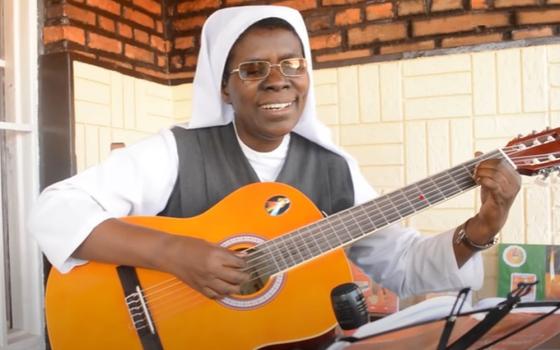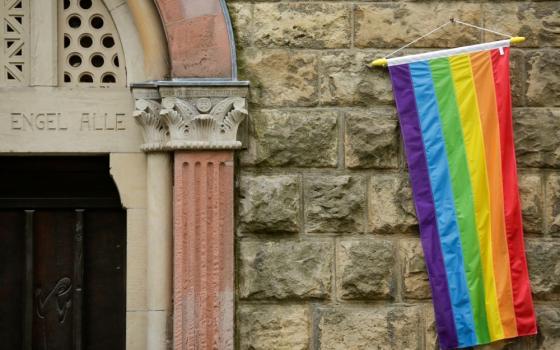Yesterday, when I had been reflecting on these Scripture lessons over the last few days and was trying to complete my reflections, I was visited by a couple of friends from another diocese nearby. They told me of what had just happened in that diocese, where, like so many other places in our country, parishes are being closed. This particular parish was closed, but the people said, "Well, the bishop can take the building, but he can't destroy our community. We're still a parish family."
|
Fourth Sunday of Lent Joshua 5:9a, 10-12 |
So they began to gather at a different place, rented a building and so on, and their parish priest felt he should stay with them. They were the community of God's people that he had been pastoring for a number of years. Now they were alienated and cut off, told they didn't exist anymore, and he decided he would stay with them. This had gone on for a while, but then just this week, the bishop excommunicated the priest and the people. Now, you think about that and listen to today's Gospel. Where do you think Jesus would be? With the outcast people or with the bishop?
When you heard the first part of today's Gospel, Luke tells us that tax collectors and sinners were seeking the company of Jesus, but the Pharisees and the Scribes frowned at this, muttering, "This man welcomes sinners and eats with them." Then Jesus tells the parable. It seems to me that people are like those sinners, I guess. They're cut off, they're outcasts, their parish priest stays with them, but the leader, like the Scribes and the Pharisees, said, "No, you can't be with them. They're sinners," like the Scribes and Pharisees telling Jesus, "No! Don't be with the sinners and the outcasts, those who are cut off." Then Jesus tries to tell them, through the parable, who God really is and where God is always -- with those who are sinners.
But now before we (any of us, I include myself) decide, "Well, OK, I know where Jesus would be and I would be with Jesus. I would go with the outcasts, the sinners, those cut off." But really, would I? Would you? When we come to the last part of the parable, the elder son, how many of us (and you don't have to raise your hand) thought, "You know, he gets kind of a raw deal." He did stay and he worked hard every day, he was faithful. The other one goes off and, as the older son says, he squandered everything with loose living, sinful living. Now he gets a celebration, and I'm left out in the fields working. Isn't that kind of unfair? Well, only if we don't understand who God really is, and this is what our lessons teach us today.
God is a God, and we say this so often, of love. God is love. Where love is, there is God. Where God is, there is love, so God is totally different from the way we usually act. In fact, there's a beautiful passage in the book of the Prophet Isaiah where the prophet says, "Seek God while God may be found. Call to God while God is near. Let the wicked abandon your way. Forsake your thoughts. Turn to God, for God will have mercy, for our God is generous and forgiving."
Then the prophet goes on to speak for God, saying, "My thoughts are not your thoughts. My ways are not your ways. For as the heavens are above the earth, so are my ways higher than your ways and my thoughts above your thoughts. As the rain and the snow come down from the heavens and do not return until they have watered the earth, so is my word that goes forth out of my mouth. It will not return to me idle, but shall accomplish my will, the purpose for which it has been sent."
Our God is a God who is not like we are so often, where we're always trying to earn God's love. Where we think that we have to merit God's love and rewards of whatever they might be, that was the older son. He thought, "I've always obeyed. I've always earned what my father should give me." But the father tries to tell him, "No, look. You're always with me. Whatever is mine is yours." So that's what God is saying to all of us and what we should always be saying to one another, that no matter what, "I love you. No matter what you've ever done, I love you." Do we have to earn that love? Do we have to do something extraordinary to come back to God? No. All we have to do is turn toward God in a spirit of openness.
Again, there's a beautiful passage in the book of Isaiah in another chapter where the prophet has been preaching to the people. They're war-like. They want to enter into an alliance with the Egyptians to fight against the Assyrians. This battle is in the Middle East and has gone on for hundreds of years. Isaiah's telling them, "No! Do not take up arms. That's not God's way," but they do it anyway and they're defeated. It ends in a disaster, but then Isaiah speaks to the people, "God is waiting to be gracious to you. God rises to show you compassion for our God is a God of justice and love. Blessed are all who wait for God."
God is always waiting to be gracious to us. We don't have to earn God's love. We don't have to do extraordinary things to be forgiven for our sins. All we have to do is turn to God, who is waiting to be gracious to us. That's the kind of God we worship and I think it's hard for us really to believe that, to really believe that God doesn't act like we so often act: "If somebody offends me, I want to get even. I'm not so quick to forgive. I'm not just waiting to be gracious to the person who has hurt me," but God is. That's what our Scriptures are telling us today. Somehow, if we could only begin to let that truth seep deeply into our whole being so that we know our God is a God is love, always waiting to be gracious to us, we would turn to God and be open and that love of God would flood over us.
But then, if we can bring ourselves to do this, be open, waiting for God to be gracious to us, and we experience this profound love of God, know that all of our sins are forgiven or healed and God loves us, then we do become what St. Paul says, a new creature in Christ. We're totally new if we really let this happen to us, and then we have to act in a different way -- not to earn something from God, but to be like God. We're made in the image of God. God is love. We want to be people who love also and are love, that's when we become full human persons, by growing more fully into the image of God, who is love.
So as Paul tells us, "For the one who is a new creature, the old things have passed away. A new world has come. All of this is the work of God, who in Jesus reconciles us to God's self and who entrusts to us the ministry of reconciliation." We're given a work to do; it's the work of God, the work that Jesus comes into the world to do -- to reconcile every person to himself and then to one another. That's how we'll build up peace and love in our communities and our families, in our country and our world, when each one of us deeply experiences how God loves me, fills me with love, enables me to be loving, and then to reach out in love and reconciliation to all others.
This grace of knowing God's love deeply is a grace that we have to strive to experience because we have been taught for so long, you have to earn God's love. Just remember, God is always waiting to be gracious to us. Let that love of God flow on us, within us and through us, and we will become those ministers of reconciliation that St. Paul says we're called to be.
[Homily given at St. Hilary Parish, Redford, Mich. The transcripts of Bishop Gumbleton's homilies are posted weekly to NCRonline.org. Sign up here to receive an email alert when the latest homily is posted.]




